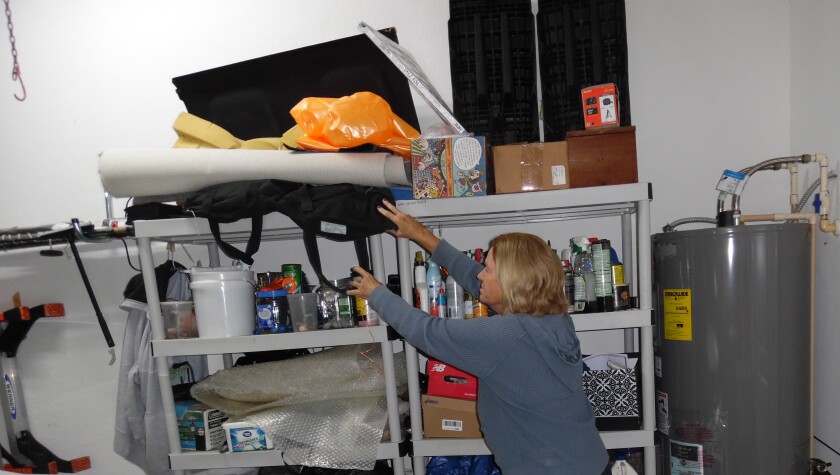My wife’s superpower is decisiveness when it comes to getting rid of things.
Call it common sense or call it ruthlessness, Marianne has no hesitation about tossing a certain red woolen sweater in the Goodwill bag if she hasn’t worn it in three years. Or the stuffed brown teddy bear that our granddaughter snuggled with as a baby, now that Summer is 8 years old.
ADVERTISEMENT
In fact, her decluttering prowess is both so feared (by yours truly) and envied (by everyone else), that her help is regularly sought by relatives when any of them is moving, redecorating, making space, or having a garage sale.
In the past year, as I’ve found it more and more difficult to find something I need, whether it be a package of drill bits I bought last month at Menards or the warm gloves I received for Christmas, I’ve learned to ask Marianne if, by any chance, she picked them up and put them away in the wrong place.
“Don’t you dare blame me,” she says.
She goes on to explain that with the layers of clothes I have stuffed into drawers, and the piles of spare bicycle and engine parts, electronic gadgets, or leftover scraps of building materials I have in boxes, cabinets, and shelves, it is a wonder I can find anything.
Somewhere in between her frank reminders is a salient point, backed by what psychologist Diane Roberts Stoler wrote in Psychology Today : “Decluttering increases self-worth , creates healthy habits, and boosts productivity .”
What better time, therefore, than at the start of a new year for all of us to clear our heads and move forward in our lives by draining our swamps of excess possessions and donating or discarding them?
My darling wife (Herr Commandant in the war against hoarders ) recommends a strategy of attacking one room at a time, starting with the smallest, and she slides open the door to my closet.
ADVERTISEMENT
“Do you really need all these suits?”
In truth, I own just four: one charcoal, one gray, one tan, and the blue pinstripe I bought for my college teaching job interview 34 years ago. But after she prodded me to recollect that, in the last five years, I’ve only worn a suit once on the occasion of my niece’s wedding, I relented and acceded to donating three of them to Goodwill, keeping the pinstripe for the next wedding, funeral, or Pulitzer Prize ceremony.
“What about these hats?” she says.
What? Like they take up any space?
One can never have enough ball caps. What if I were to leave one on a park bench? Or another blew off and away in my boat?
“You have at least 20 hanging here, and I only ever see you wearing the newest.”
Again, she is annoyingly correct. And while my giving up 15 of those caps feels like a betrayal of old friends, the opportunity to buy a new one without feeling guilty makes up for it.
ADVERTISEMENT

The next day, Marianne invades our garage, where an entire shelving unit is chockful of old things I’ve replaced but have been keeping for spare parts, such as a ceiling fan, a kitchen faucet, and 12-volt battery charger.
Toss it all, she says.
She reasons that when something like a faucet breaks, it’s easier for my caliber of handyman to buy a replacement rather than to try repairing the old item. Her argument I find appealing. Liberating, in fact.
I drop the battery charger in the recycling barrel and set the ceiling fan and faucet in the pile for Habitat for Humanity.
Next, she directs me to clear out an entire row of gallon, quart, and spray cans of paint I’d been saving for touch-ups. Since all of it has sat here for a year or more, it has likely congealed, not to mention there’s no longer a need to keep originals, thanks to computerized color-matching technology available at the big-box stores. And resting on the floor in front of the paint shelves are a lawn edger, a weed wacker, and a power washer, none of which I use anymore, and we earmark them for donation.
Since the remaining back wall in the garage holds all my fishing rods, we are done, and I head for the kitchen for something to drink. Marianne, however, lags behind.
Why 13 fishing poles, she asks?
ADVERTISEMENT
Never mind, I say. Fishing is my pastime. Like with my neighbor Frank who has eight guitars because his passion is music.
She shakes her head. Employing her enhanced interrogation techniques, she establishes that I only ever use half a dozen at the most. I object and say extras are needed for when people visit, or if a good one breaks.
But the woman will stop at nothing, and she plays the kid card: “Don’t you think some young boy or girl would be thrilled to have one of those?”
I’ve no defense for that, and we bundle seven rods and reels for the Salvation Army.
Afterward, I feel physically lighter, freer, and even a little noble for the surge in our charitable donating. To make the feeling last, I resist the temptation to restock by avoiding clicking on Amazon.
The new year feels good already. And I take comfort that my blue pinstripe suit, safely protected by the dry cleaner's plastic cover, has the back of my closet all to itself.
David McGrath is formerly of Hayward; is an emeritus professor of English at the College of DuPage in Illinois; is an author, most recently of “ Far Enough Away ;” and is a frequent contributor to the News Tribune Opinion page. He can be reached at profmcgrath2004@yahoo.com . A version of this column was published originally in the Chicago Tribune.
ADVERTISEMENT












